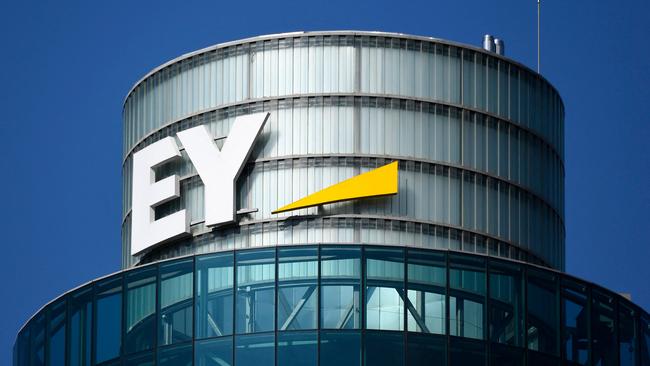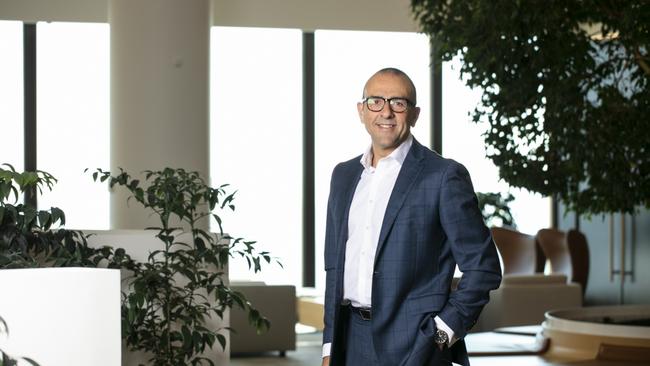EY Australia targets growth as revenue falls from record high following weaker demand
The consulting giant says its government consulting business offers plenty of value despite facing softer demand, as it spells out how AI will drive the company to growth in the new year.

Audit and consulting giant EY Australia will prioritise artificial intelligence and technology transformation as it positions itself for growth, following a 5.5 per cent decline in annual revenue.
EY Oceania chief executive David Larocca has also reaffirmed its commitment to government consultancy services, saying the firm offered unique value for state and federal governments amid a pullback in demand in the wake of the PwC tax scandal.
A slowdown in the economy resulted in a $160m decline in revenue to $2.81bn, driven by inflation and weaker demand for consulting services from government, financial services and other corporate clients.
EY, however, saw growth in the energy, mining and telco, media and technology sectors.
Mr Larocca nominated assurance and its tax service line as bright spots in the past year, telling The Australian that EY was in a strong position for the new financial year, with single-digit growth expected.
He said EY had positioned itself for growth opportunities when the economy began to recover and was targeting increased demand for AI services.
EY plans to have the largest and most AI-proficient professional services team in Australia, underpinned by a global $US1.4bn investment in building its own enterprise-scale AI platform, EY.ai EYQ.
“We have a disrupted, rapidly changing world, both for our clients and our sector, so we’re prioritising AI and new technology transformation – both important topics to our clients,” Mr Larocca said. “Managed services are an area that we’re increasingly putting investment into.”
Mr Larocca said technology alliances would allow it to use AI to address challenges and deliver substantial value to clients, underpinned by the EY Global Network and the new global ‘‘All in’’ strategy.
“AI offers us growth opportunities to help clients grappling with the prospect and the risks, so we’re putting ourselves forward to support them with that agenda,” he said. “We also see AI helping ourselves in the way we work by being efficient and focusing on the things that matter, but in a responsible and safe way.”
Revenue for the firm’s assurance service line rose nearly 13 per cent to $710m, aided by the transfer of its risks business from consulting, which saw revenue fall around 6 per cent to $1.04bn.

The tax division had revenue of $610m following the movement of its people advisory service division into consulting. EY’s strategy and transactions service line delivered $450m.
Over the past few months, EY has cut more than 100 jobs, while KPMG has let more than 200 people go in two recent restructures. PwC made 329 roles redundant, while Deloitte announced plans to streamline its business into four operating units.
Mr Larocca said that the decision to make staff redundant was difficult but necessary to sustain the business amid weaker economic activity and demand.
“We’ve made some very difficult decisions, but we’re in a strong position moving forward. Obviously, we keep an eye on the market, but we’ve planned for growth,” he said.
In the last fiscal year, EY Australia appointed 53 new partners, including 31 promotions to partner and 22 new partners hired. The firm appointed 20 associate partners (12 promotions and eight hires) and hired 658 graduates. Of newly promoted partners and associated partners, 32 per cent and 50 per cent are women, respectively.
Mr Larocca said EY was committed to its government practice, despite federal and state governments turning away from consultancy services after the PwC tax scandal.
“We remain confident about the unique value and support we provide our public sector clients, both state and federal, including access to skills and capabilities that, in some cases, don’t exist in Australia,” he said.
“An important part of our engagements with the government is the transfer of skills and knowledge to the public sector. That’s something we continue to be focused on, and ensuring we deliver value for money.”
EY had invested more than $50m in its talent agenda, including learning and development, recruitment and onboarding, wellbeing initiatives and cultural change. A year on from the release of a report that detailed bulling, sexual harassment and racism claims, Mr Larocca said that the firm had taken action to ensure a safe and inclusive workplace.
“We acknowledge that transformative culture change isn’t delivered overnight – nor will it ever be done. It remains a long-term, continuous investment to ensure we build upon a diverse, respectful workplace where our people feel they can belong, perform and thrive,” he said.
“We will continue to be transparent about how we’re progressing in our annual Value Realised Scorecard.”




To join the conversation, please log in. Don't have an account? Register
Join the conversation, you are commenting as Logout